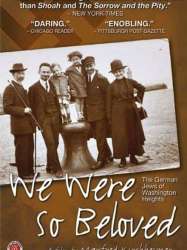Jews of Iran is a film of genre Documentary directed by Ramin Farahani
Jews of Iran (2005)

If you like this film, let us know!
Jews of Iran is a 2005 documentary film by Iranian-Dutch filmmaker Ramin Farahani. The film examines the lives of Persian Jews living in Iran's predominately Islamic society. Although they face discrimination, they choose to remain in their homeland rather than flee the country.
The documentary breaks ground as the first film to cover this subject, capturing both friendships among Muslims and Jews and the prejudices against the Jewish minority. Farahani states that Jews of Iran is meant to "help westerners correct their image" of the Middle East and allow them to "see the nuances" within the culture.
Synopsis
With the background of Middle Eastern music, the film offers shots of century-old architecture and travels through Tehran, Isfahan and Shiraz. A broad range of Jewish Iranians are interviewed, from an old woman in a hospital to a bright computer science student.Comments
Leave comment :
Suggestions of similar film to Jews of Iran
There are 0 films with the same director, 8965 with the same cinematographic genres, 3314 films with the same themes (including 250 films with the same 3 themes than Jews of Iran), to have finally 70 suggestions of similar films.If you liked Jews of Iran, you will probably like those similar films :

Paper Clips (2004)
, 1h22Origin USA
Genres Documentary
Themes Films about education, Films about racism, Films about religion, Documentary films about racism, Documentary films about law, Documentary films about war, Documentary films about historical events, Documentary films about religion, Political films, Films about Jews and Judaism, Documentary films about World War II
Actors Tom Bosley
Rating72%





Paper Clips takes place in the rural, blue-collar Tennessee community of Whitwell, where a middle-school class attempts to gauge the magnitude of World War II's Holocaust by collecting paper clips, each of which represents a human life lost in the Nazis' slaughter of Jews. The idea came in 1998 from three of the teachers at the school and was completed in their eighth grade classrooms. The students ultimately succeeded in collecting over 25 million paperclips.

We Were So Beloved (1986)
, 2h25Genres Documentary
Themes Films about racism, Films about religion, Documentary films about racism, Documentary films about law, Documentary films about war, Documentary films about historical events, Documentary films about religion, Political films, Films about Jews and Judaism, Documentary films about World War II
Rating71%






Paragraph 175 (2000)
Directed by Rob Epstein, Jeffrey Friedman
Genres Documentary, Historical
Themes Films about racism, Films about religion, Films about sexuality, LGBT-related films, Documentary films about racism, Documentary films about law, Documentary films about war, Documentary films about historical events, Documentaire sur l'homosexualité, Documentary films about religion, Political films, Films about Jews and Judaism, Documentary films about World War II, LGBT-related films, LGBT-related film
Actors Rupert Everett
Rating76%





Les homosexuels ont été comme tant d'autres les victimes du régime hitlérien. Ils étaient persécutés en vertu du paragraphe 175 du code pénal allemand. Ce paragraphe, datant de 1871, condamnait à la prison "les actes contre nature" entre hommes.
 , 1h27
, 1h27Genres War, Documentary
Themes Films about racism, Films about religion, Documentary films about racism, Documentary films about law, Documentary films about war, Documentary films about historical events, Documentaire sur une personnalité, Documentary films about politics, Documentary films about religion, Political films, Films about Jews and Judaism, Documentary films about World War II
Rating72%






Prisoner of Paradise (2002)
, 1h36Directed by Malcolm Clarke
Origin USA
Genres Documentary
Themes Films about films, Films about racism, Films about religion, Documentary films about business, Documentary films about the film industry, Documentary films about racism, Documentary films about law, Documentary films about war, Documentary films about historical events, Documentaire sur une personnalité, Documentary films about religion, Political films, Films about Jews and Judaism, Documentary films about World War II, Documentary films about films
Actors Ian Holm, Renée Saint-Cyr, Hans Albers, Marlene Dietrich, Kurt Gerron, Peter Lorre
Rating74%






The Colour of Olives (2006)
, 1h37Directed by Carolina Rivas
Origin Israel
Genres Documentary
Themes Films set in Africa, Films about families, Films about religion, Documentary films about law, Documentary films about war, Documentary films about historical events, Documentaire sur une personnalité, Documentary films about politics, Documentary films about religion, Political films, Films about Jews and Judaism
Rating70%






Song of a Jewish Cowboy (2002)
, 18minutesOrigin USA
Genres Documentary
Themes Films about music and musicians, Films about religion, Documentary films about music and musicians, Documentaire sur une personnalité, Documentary films about religion, Musical films, Films about Jews and Judaism

Portrecista (2005)
, 52minutesGenres Documentary
Themes Films about racism, Films about religion, Documentary films about the visual arts, Documentary films about racism, Documentary films about law, Documentary films about war, Documentary films about historical events, Documentaire sur une personnalité, Documentary films about religion, Political films, Films about Jews and Judaism, Documentary films about World War II
Rating78%





Portrecista (The Portraitist) examines the life and work of Wilhelm Brasse, who had been trained as a portrait photographer at his aunt's studio prior to World War II and passionately loved taking photographs. After his capture and imprisonment by the Nazis at Auschwitz concentration camp in 1940, at the age of 23, he was forced to take "identity pictures" of between approximately 40,000 to 50,000 other inmates between 1940 and 1945. With "courage and skill", documenting "cruelty which goes beyond all words ... for future generations", after his liberation at the end of World War II, Brasse "could not continue with his profession" and would never take another photograph.

Baba Lubba (1995)
, 1hOrigin Israel
Genres Documentary
Themes Films about music and musicians, Films about religion, Documentary films about music and musicians, Documentaire sur une personnalité, Documentary films about religion, Musical films, Films about Jews and Judaism

Barricades (1969)
, 1h5Directed by Ram Loevy
Origin Israel
Genres Documentary
Themes Films set in Africa, Films about religion, Documentary films about law, Documentary films about war, Documentary films about historical events, Documentaire sur une personnalité, Documentary films about politics, Documentary films about religion, Political films, Films about Jews and Judaism
 Connection
Connection